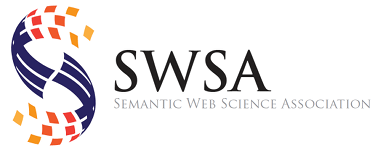Abstract
Knowledge graphs (KGs) have become the preferred technology for representing, sharing and adding knowledge to modern AI applications. While KGs have become a mainstream technology, the RDF/SPARQL-centric toolset for operating with them at scale is heterogeneous, difficult to integrate and only covers a subset of the operations that are commonly needed in data science applications. In this paper we present KGTK, a data science-centric toolkit designed to represent, create, transform, enhance and analyze KGs. KGTK represents graphs in tables and leverages popular libraries developed for data science applications, enabling a wide audience of developers to easily construct knowledge graph pipelines for their applications. We illustrate the framework with real-world scenarios where we have used KGTK to integrate and manipulate large KGs, such as Wikidata, DBpedia and ConceptNet.
Access this chapter
Tax calculation will be finalised at checkout
Purchases are for personal use only
Change history
01 November 2020
In the originally published version of chapter 18 the name of Rongpeng Li was misspelled. This has been corrected.
Notes
- 1.
- 2.
- 3.
- 4.
- 5.
- 6.
- 7.
- 8.
- 9.
- 10.
- 11.
- 12.
A list of such projects can be found in https://github.com/fhircat/CORD-19-on-FHIR/wiki/CORD-19-Semantic-Annotation-Projects.
- 13.
- 14.
- 15.
- 16.
- 17.
- 18.
- 19.
- 20.
- 21.
- 22.
- 23.
- 24.
- 25.
- 26.
- 27.
References
Auer, S., Bizer, C., Kobilarov, G., Lehmann, J., Cyganiak, R., Ives, Z.: DBpedia: a nucleus for a web of open data. In: Aberer, K., et al. (eds.) ASWC/ISWC -2007. LNCS, vol. 4825, pp. 722–735. Springer, Heidelberg (2007). https://doi.org/10.1007/978-3-540-76298-0_52
Beek, W., Raad, J., Wielemaker, J., van Harmelen, F.: sameAs.cc: the closure of 500M owl:sameAs statements. In: Gangemi, A., et al. (eds.) ESWC 2018. LNCS, vol. 10843, pp. 65–80. Springer, Cham (2018). https://doi.org/10.1007/978-3-319-93417-4_5
Beek, W., Rietveld, L., Ilievski, F., Schlobach, S.: LOD lab: scalable linked data processing. In: Pan, J.Z., et al. (eds.) Reasoning Web 2016. LNCS, vol. 9885, pp. 124–155. Springer, Cham (2017). https://doi.org/10.1007/978-3-319-49493-7_4
Buil-Aranda, C., Hogan, A., Umbrich, J., Vandenbussche, P.-Y.: SPARQL web-querying infrastructure: ready for action? In: Alani, H., et al. (eds.) ISWC 2013. LNCS, vol. 8219, pp. 277–293. Springer, Heidelberg (2013). https://doi.org/10.1007/978-3-642-41338-4_18
Devlin, J., Chang, M.W., Lee, K., Toutanova, K.: BERT: pre-training of deep bidirectional transformers for language understanding. arXiv preprint arXiv:1810.04805 (2018)
Fernández, J.D., Beek, W., Martínez-Prieto, M.A., Arias, M.: LOD-a-lot. In: d’Amato, C., et al. (eds.) ISWC 2017. LNCS, vol. 10588, pp. 75–83. Springer, Cham (2017). https://doi.org/10.1007/978-3-319-68204-4_7
Fernández, J.D., Martínez-Prieto, M.A., Polleres, A., Reindorf, J.: HDTQ: managing RDF datasets in compressed space. In: Gangemi, A., et al. (eds.) ESWC 2018. LNCS, vol. 10843, pp. 191–208. Springer, Cham (2018). https://doi.org/10.1007/978-3-319-93417-4_13
Gazzotti, R., Michel, F., Gandon, F.: CORD-19 named entities knowledge graph (CORD19-NEKG) (2020). https://github.com/Wimmics/cord19-nekg, University Côte d’Azur, Inria, CNRS
Hartig, O.: RDF* and SPARQL*: an alternative approach to annotate statements in RDF. In: International Semantic Web Conference (Posters, Demos & Industry Tracks) (2017)
Hernández, D., Hogan, A., Riveros, C., Rojas, C., Zerega, E.: Querying Wikidata: comparing SPARQL, relational and graph databases. In: Groth, P., et al. (eds.) ISWC 2016. LNCS, vol. 9982, pp. 88–103. Springer, Cham (2016). https://doi.org/10.1007/978-3-319-46547-0_10
Ilievski, F., Szekely, P., Cheng, J., Zhang, F., Qasemi, E.: Consolidating commonsense knowledge. arXiv preprint arXiv:2006.06114 (2020)
Kenig, B., Gal, A.: MFIBlocks: an effective blocking algorithm for entity resolution. Inf. Syst. 38(6), 908–926 (2013)
Lerer, A., et al.: PyTorch-BigGraph: a large-scale graph embedding system. arXiv preprint arXiv:1903.12287 (2019)
Leskovec, J., Rajaraman, A., Ullman, J.D.: Mining of Massive Data Sets. Cambridge University Press, Cambridge (2020)
Liu, Y., et al.: RoBERTa: a robustly optimized BERT pretraining approach. arXiv preprint arXiv:1907.11692 (2019)
Martínez-Prieto, M.A., Arias Gallego, M., Fernández, J.D.: Exchange and consumption of huge RDF data. In: Simperl, E., Cimiano, P., Polleres, A., Corcho, O., Presutti, V. (eds.) ESWC 2012. LNCS, vol. 7295, pp. 437–452. Springer, Heidelberg (2012). https://doi.org/10.1007/978-3-642-30284-8_36
Pedregosa, F., et al.: Scikit-learn: machine learning in Python. J. Mach. Learn. Res. 12, 2825–2830 (2011)
Piccinno, F., Ferragina, P.: From TagME to WAT: a new entity annotator. In: Proceedings of the First International Workshop on Entity Recognition & Disambiguation, pp. 55–62 (2014)
Sanh, V., Debut, L., Chaumond, J., Wolf, T.: DistilBERT, a distilled version of BERT: smaller, faster, cheaper and lighter. arXiv preprint arXiv:1910.01108 (2019)
Sap, M., et al.: ATOMIC: an atlas of machine commonsense for if-then reasoning. In: Proceedings of the AAAI Conference on Artificial Intelligence, vol. 33, pp. 3027–3035 (2019)
Seaborne, A., Carothers, G.: RDF 1.1 N-triples. W3C recommendation, W3C, February 2014. http://www.w3.org/TR/2014/REC-n-triples-20140225/
Speer, R., Chin, J., Havasi, C.: ConceptNet 5.5: an open multilingual graph of general knowledge (2016)
Verborgh, R., Vander Sande, M., Colpaert, P., Coppens, S., Mannens, E., Van de Walle, R.: Web-scale querying through linked data fragments. In: LDOW. Citeseer (2014)
Vrandečić, D., Krötzsch, M.: Wikidata: a free collaborative knowledgebase. Commun. ACM 57(10), 78–85 (2014)
Wang, L.L., et al.: CORD-19: The COVID-19 open research dataset. ArXiv abs/2004.10706 (2020)
Wu, L., Petroni, F., Josifoski, M., Riedel, S., Zettlemoyer, L.: Zero-shot entity linking with dense entity retrieval. arXiv preprint arXiv:1911.03814 (2019)
Acknowledgements
This material is based on research sponsored by Air Force Research Laboratory under agreement number FA8750-20-2-10002. The U.S. Government is authorized to reproduce and distribute reprints for Governmental purposes notwithstanding any copyright notation thereon. The views and conclusions contained herein are those of the authors and should not be interpreted as necessarily representing the official policies or endorsements, either expressed or implied, of Air Force Research Laboratory or the U.S. Government.
Author information
Authors and Affiliations
Corresponding author
Editor information
Editors and Affiliations
Rights and permissions
Copyright information
© 2020 Springer Nature Switzerland AG
About this paper
Cite this paper
Ilievski, F. et al. (2020). KGTK: A Toolkit for Large Knowledge Graph Manipulation and Analysis. In: Pan, J.Z., et al. The Semantic Web – ISWC 2020. ISWC 2020. Lecture Notes in Computer Science(), vol 12507. Springer, Cham. https://doi.org/10.1007/978-3-030-62466-8_18
Download citation
DOI: https://doi.org/10.1007/978-3-030-62466-8_18
Published:
Publisher Name: Springer, Cham
Print ISBN: 978-3-030-62465-1
Online ISBN: 978-3-030-62466-8
eBook Packages: Computer ScienceComputer Science (R0)


